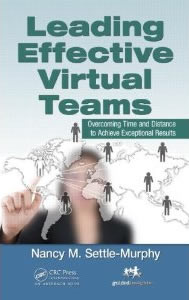Kendra, the leader of a cross-functional team working on a highly visible and critical company project, imagined that things were going pretty well for her virtual team. People seemed to have few complaints or disagreements, and the work was getting done, but just barely. But about six months into the project, Kendra noticed that people had become noticeably quieter in team meetings, and people were coming to their 1:1s with fewer discussion items. Some even suggested they cancel the 1:1s altogether.
Sufficiently concerned, Kendra created a survey to solicit anonymous feedback about the quality of team communications. Expecting to see mostly positive responses, Kendra was devastated as she read comments like:
- Everyone’s afraid to say what’s really going on.
- I hate to ask for advice, because everyone’s always so busy, so I have to figure out everything on my own.
- I have so many ideas I can’t wait to share, but somehow, there never seems to be an opportunity.
- Team meetings are a complete waste of time. We rush through agenda items that could have been covered in Slack or email, and never have the kind of discussions we really need.
- We’re pressured to go along with things many of us don’t necessarily agree with. Debate is strongly discouraged.
- I’m afraid to ask for help, because everyone else seems to be managing their workloads okay. I don’t want to be the only one who can’t.
Like many other virtual or hybrid teams, Kendra’s team needed help initiating and encouraging honest conversations to build trust, strengthen collaboration, and help move the team forward.
Drawing from recent scripts from Harvard Business School professor and author Amy Edmonson, who popularized the importance of creating psychological safety as a prerequisite for building trust, I have listed a set of behaviors with sample scripts that team leaders and members alike can use to pave the way for candid, meaningful and important conversations to build relationships and gain much-needed traction.
When you’re the leader:
- Be vulnerable: I’m a little overwhelmed myself with all of these upcoming organizational changes, which will have a big impact on our team’s work. I could really use your input at this point.
- Be supportive: These are unprecedented times, and none of us has a roadmap to go by. We’ll be taking some detours and making some mistakes along the way, and that’s okay.
- Be inclusive: Margie, since you’re relatively new to the team, it would be great to hear your perspectives. John, what can we learn from your experiences? What other viewpoints will be important for us to hear right now, and what’s the best way to hear them?
- Be attentive: Jen, you look like you may want to say something. Kevin, it seems that you might have some concerns that we’d all benefit from hearing. I sense that our energy is depleted right now; let’s break for five minutes and come back ready to dive back in.
- Be provocative: Everyone seems to agree with this idea, but I imagine that some of you may have some unspoken reservations. Who’s willing to voice an opposing viewpoint so we can explore the trade-offs?
- Be curious: Even though most of us agree that this project went pretty well, I’m wondering what we could have done differently. What friction points can we eliminate for next time? What barriers prevented you from working more quickly or easily? What could I have done differently or more of to support you?
- Be kind: Pete, unless I am misreading the signs here, I can see that the last two weeks have been utterly exhausting for you. What kind of support or help would be most helpful right now, from me or the team?
- Be appreciative: I realize that pulling off this project on time meant many long hours for most of you, which probably had a big impact on your personal lives. Thanks to all of you for helping to make this happen. (And thank your families, friends and loved ones for me, too!)
When you’re a team member:
- Be ready to initiate tough conversations: I need to talk about something that’s been bothering me, and it’s never seemed to be the right time. Do you have a few minutes now?
- Be willing to be the bearer of bad news: Our dashboard may show green, but in reality it’s blinking bright red. I wanted you to hear what’s really going on before you present to your boss tomorrow.
- Admit when you’re stuck: I’ve tried everything I can think of, and I just can’t get out of the starting gate. I have an idea for a new approach that might work, if I can run it by you.
- Acknowledge mistakes: I made some bad assumptions when I submitted our budget forecast, which can affect all of us. I’d love to figure out how I can make this right, assuming it’s not too late.
- Admit when you don’t have the answer: We thought this concept would work, but it’s not turning out as planned, and we’re not sure why. I’m not sure where to go from here.
- Ask for input, assistance: I have checked this proposal a dozen times, and something still looks off to me. Would you be willing to spend time between now and Thursday to have a look at this?
- Be willing to name dysfunctional behavior: We’ve been circling around this issue for weeks, with everyone speaking over everyone else trying to persuade each other about our own viewpoints. We’re not getting anywhere. Can we agree on some team norms to help us make an informed decision that we can all agree with?
- Be humble: What’s the best way for me to learn how to improve my work? Who might have advice or guidance? What resources can I check out?
- Offer to help: I know that some people seem to be really overloaded right now. I can rearrange my work over the next couple of weeks to jump in, given a little advance notice.
Opening up the lines of meaningful, direct communication can be especially hard when some or all team members work remotely. Since we have a limited ability to convey or sense thoughts and feelings through body language, we must be exceptionally thoughtful about asking questions and making statements that invite conversation, build trust and strengthen relationships. Whether you’re a team leader or team member, you can try modifying one or two of these sample scripts, or come up with some of your own. Or better yet, discuss with your team what behaviors are vital for your team to thrive, and work together to create sample scripts everyone can draw from.
Links
Related services:
“Hybrid” Meeting Facilitation Services – Guided Insights
Virtual Meeting Facilitation Services – Guided Insights
Onsite Meeting Facilitation Services – Guided Insights
Leading High-Performing Virtual and Hybrid Teams
Planning and Leading Engaging Virtual Meetings
Related articles:
To Build Trust Within Virtual Teams, Psychological Safety Is Everything – Guided Insights
Healthy Conversations Can Bring Virtual Teams Back To Life – Guided Insights
5 Things High-Performing Teams Do Differently (hbr.org)
Rebuilding Relationships Across Teams in a Hybrid Workplace (hbr.org)
Make Your Employees Feel Psychologically Safe – HBS Working Knowledge




